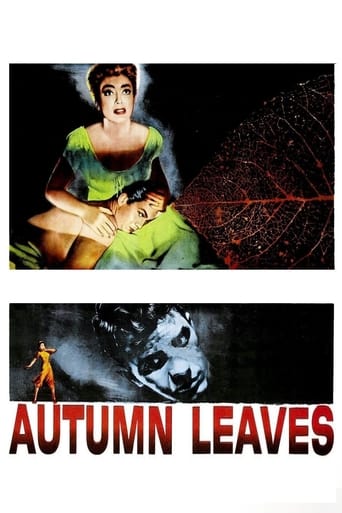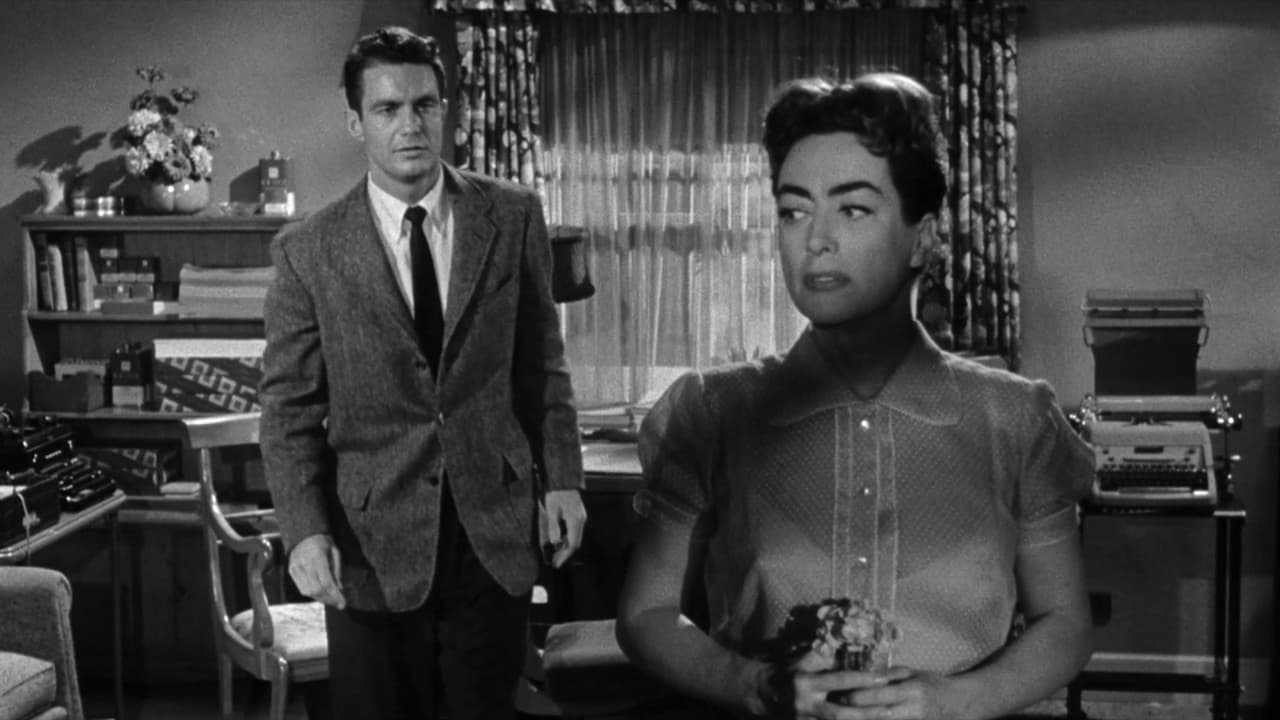George Wright
There's something very rewarding about discovering a well-acted mid-20th century movie you never heard about, in this case, Autumn Leaves starring Joan Crawford and Cliff Robertson, which I saw on TCM. In some ways dated, this movie shines with excellent acting by the two leads - one a star of the film noir era, and the other, a future star making his film debut. The story involves a romance that work-at-home secretary Joan Crawford only reluctantly embraces because her lover is a much younger man. Cliff Robertson falls head over heels in love with her and they marry. Of course, you know the wheels are going to come off this match. The young man becomes traumatized by the appearance of his father, played by a distinguished looking but thoroughly evil Lorne Green and his femme fatale, Vera Miles. Crawford is confused by the bizarre situation and her husband suffers a complete mental breakdown. There is some surprisingly strong language and domestic violence for a movie of the 1950's. Crawford and Robertson deliver strong performances, particularly as the movie moves to its climax. For his first movie, Robertson shows surprising range and strength as an actor. Presented with a husband who is now unhinged, Crawford, takes action to help him, knowing it might have unintended consequences for both of them. This is a movie that keeps its momentum and doesn't disappoint. Highly recommend.
Naught Moses
She's the typical co-dependent, stand-by-your-man, til-death-do-us-part product of the in-doctrine-ations of the adjust-til-it-kills-you, (supposedly) Greatest Generation. He's (ostensibly) the product of a narcissistic (and crazy-making) father and the equally narcissistic -- and father-resembling -- woman he married in late adolescence. The drama is mid-century pulp fiction, and, of course, (delusionally) hopeful. (Hey! She's getting her @$$ kicked, seemingly forgetting it, and coming back for more.) (But... "Love cures all!") (Please.)High-voltage / high-amperage / long-duration electroconvulsive and/or coma-inducing insulin therapy had =no= such effect upon psychotic patients of the heroic sort depicted here. Patients treated thus tended to emerge with wholesale memory loss and not know their own parents or spouses for months, years, or... forever. But they =were= easier to manage. Was he looking for a "good enough mother" in Joanie's character? Maybe so. One thing's for sure, though: Joanie at =50= was downright =amazing= looking. (I know. "The best that money can buy" and all that, but even so...) she was looking pretty good. (Ditch those eyebrows, though, Joan. Ya looked so much better in "The Women.")
edwagreen
Getting older and lonely, Joan Crawford falls victim to the charm of Cliff Robertson in this terrific 1956 film. After their marriage, it becomes evident that the Oedipus complex is in full bloom. Robertson needed a mother-like image to try and soothe a terrible trauma he had discovered earlier.Robertson starts off talking as if he came from a chicken farm in Arkansas. Does he ever develop as the movie moves forward and gives a compelling performance as a psychotic man victimized by his father and former wife, both played well by Lorne (Bonanza) Greene and Vera Miles, respectively.With his mental illness blooming in full, there is no other alternative but to institutionalize him. Shepard Strudwick, the psychiatrist, warns Millie, yes Crawford's a Mildred again, that in being cured he may no longer psychologically need her.Truly a wonderful film with memorable performances by all. Veteran pro Ruth Donnelly, who was so funny in the films of 1930s, comes across as a sympathetic, wise landlady.
Steffi_P
Sometimes in Hollywood, motion picture style seemed to come about just through force of habit. Film noir was never recognised as a genre in its own era, but there was a time in the 1950s when it seemed every low budget drama was automatically shot in that stark, eerie, chiaroscuro fashion – regardless of how "noir"-ish it really was.Autumn Leaves, in some ways, IS quite a grim little melodrama. Many of the most pessimistic pictures of the 40s and 50s dealt with the romance-gone-wrong scenario, where one partner turns out to be not what they claimed they were – check out the excellent Scarlet Street (1945) for the cruellest example thereof. But Autumn Leaves is different. This isn't a nightmarish "what if?" thriller – it has too much respect for its characters to be that. It is more a bittersweet and, at times, very mature look at how insanity and mental trauma can impact upon human relationships. Above all it is a romantic picture from its first frame to its last.And yet, director Robert Aldrich insists upon giving it the noir makeover with his usual penchant for slanting shadows, odd camera angles and foreground clutter, all of which is hardly necessary and just a little tiresome. Still, to his credit, this hard-boiled action director does find room for a more tender, person-centred approach, with some long takes and clarity of image in key scenes. There are also some truly wonderful subtleties to watch out for. For example when Joan Crawford fails to answer Cliff Robertson's proposal, we cut from close-up to mid-shot, where in the background a receptionist puts down a phone – a little note of rejection that we will subconsciously pick up on.Crawford and Robertson at least seem to understand what this picture is about. You can see how good an actress Crawford was by reading up on the kind of abusive and maladjusted person she was in real life. She gives a totally believable presentation of someone with absolute loving purity and patience, and her character's devotion to Robertson's gives the picture its emotional weight. Robertson, in his earliest lead role, demonstrates that combination of warmth and endearing frailty which characterises his most memorable roles, without ever quite descending into a corny caricature.Speaking of corniness, Autumn Leaves is not without its slightly cringeworthy moments. There is the overly extravagant musical score, including a fuzzy blur as we segue into a flashback. There is the somewhat trite peachiness with which Crawford and Robertson's romance unfolds. There is even a barefaced rip-off of the beach scene out of From Here to Eternity. But to be honest, all of this adds to its charm. Autumn Leaves is, in many ways, the opposite of film noir cynicism. It shows people struggling to make romance work in spite of the desperation of their circumstances.


 AD
AD


